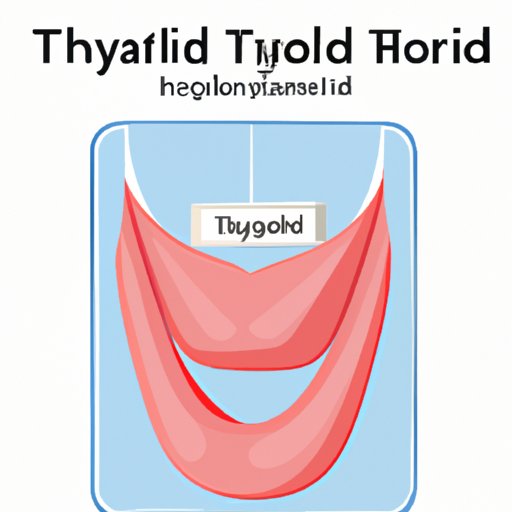
How to Know If You Have Thyroid Problems
The thyroid gland is a small, butterfly-shaped gland situated in the neck. It produces hormones that play a crucial role in regulating bodily functions, such as metabolism, heart rate, and body temperature. Thyroid problems occur when this gland produces too much or too little hormones, leading to various health issues. Thyroid problems are common and affect up to 20 million people in the United States alone. Early detection and management of thyroid problems are essential to avoid complications that could arise from untreated thyroid issues. In this article, we will explore how to know if you have thyroid problems.
Symptoms Checklist
Thyroid disorders have several symptoms linked with them. Common symptoms of hypothyroidism, which is a condition where the thyroid gland produces insufficient hormones, include:
- Weight gain or difficulty in losing weight
- Depression, fatigue, or weakness
- Dry skin, hair loss, or brittle nails
- Cold intolerance or feeling cold all the time
- Constipation or irregular bowel movements
On the other hand, hyperthyroidism, which is a condition where the thyroid gland produces excess hormones, has symptoms that include:
- Weight loss or increased appetite
- Anxiety, irritability, or nervousness
- Increased heart rate or palpitations
- Heat intolerance or sweating excessively
- Diarrhea or frequent bowel movements
If you notice any of these symptoms, it could be an indication of thyroid problems. However, keep in mind that symptoms vary from person to person, and some people may not show any symptoms at all.
The Importance of Testing
Thyroid disorders are often overlooked because their symptoms can be mistaken for other ailments, making them difficult to diagnose. In some cases, symptoms may be mild or absent, leading to their unnoticed presence in the body. A blood test called the thyroid-stimulating hormone (TSH) test is commonly used to diagnose thyroid problems. It measures the amount of TSH in the blood, which is a hormone produced by the pituitary gland that regulates the thyroid gland’s hormone production. High levels of TSH mean an underactive thyroid, while low levels indicate an overactive thyroid. If you suspect you have thyroid problems, ask your healthcare provider for a thyroid test.
According to the American Thyroid Association, about 20 million Americans have thyroid problems, but only about 60% of them are aware of their condition. Women are five to eight times more likely to develop thyroid problems than men, and the risk increases with age. People who have had previous thyroid problems, a family history of thyroid problems, or other autoimmune diseases such as lupus, rheumatoid arthritis, or type 1 diabetes are also at increased risk of developing thyroid disorders.
Risk Factors
Several risk factors increase the likelihood of developing thyroid problems, including:
- Female gender
- Age over 60 years
- Family history of thyroid problems
- Previous thyroid surgery or radiation treatment
- Autoimmune diseases, such as type 1 diabetes, lupus, or rheumatoid arthritis
- Pregnancy
- Smoking
Understanding your personal risk factors is essential in ensuring you get the appropriate testing and care if thyroid problems arise.
When to See a Doctor
If you notice any thyroid problem symptoms or have any of the above risk factors, it’s essential to talk to a healthcare provider. They may recommend a thyroid-stimulating hormone (TSH) test or other blood tests to evaluate your thyroid function. The thyroid function test typically includes the measurement of TSH, as well as other thyroid hormones such as thyroxine (T4) and triiodothyronine (T3).
Screening for thyroid disorders is not generally recommended for someone who has no symptoms, but some groups are at higher risk and should be screened at regular intervals. Women who are trying to conceive or who are pregnant, individuals with a family history of thyroid problems, and those with autoimmune diseases are among the groups recommended to be screened more frequently.
Debunking Myths
There are several misconceptions surrounding thyroid problems. One common myth is that thyroid problems only occur in women, but the reality is that they can occur in men as well. Another myth is that hypothyroidism always causes weight gain. While it’s typical to gain weight with an underactive thyroid, it’s not always the case. Lastly, some people believe that natural remedies such as essential oils or supplements can cure thyroid problems. However, there is no scientific evidence to support these claims, and these remedies should not replace doctor-prescribed therapies.
Promoting Awareness
Thyroid problems can have a significant impact on overall health, affecting everything from energy levels to fertility. Promoting awareness of thyroid problems can lead to early detection, better outcomes, and improved quality of life. By learning about personal risk factors, symptoms, and when to see a healthcare provider, individuals can take charge of their health and seek medical attention when necessary.
Living with Thyroid Problems
If you receive a diagnosis of thyroid problems, your healthcare provider may recommend lifestyle changes or prescribe medication to manage your symptoms. Eating a diet rich in fruits, vegetables, and lean protein can support overall health. On the other hand, processed foods, sugary drinks, and alcohol can exacerbate thyroid problems, leading to complications.
There are several treatment options available for thyroid problems, depending on the type of thyroid disorder and the severity of the condition. Hypothyroidism is typically treated with levothyroxine, a thyroid hormone replacement drug. Hyperthyroidism may be treated with medications to reduce hormone production or surgical removal of the thyroid gland. In some cases, radioactive iodine therapy may be recommended.
Conclusion
Thyroid problems are common and affect millions of people worldwide. Identifying symptoms, understanding risk factors, and regular testing are essential in detecting thyroid disorders early and preventing complications. By dispelling common myths and promoting awareness, individuals can take charge of their health and seek appropriate care when necessary. If you suspect you have thyroid problems, talk to your healthcare provider to learn more about your personal risk factors and what screening or treatment might be appropriate for you.





